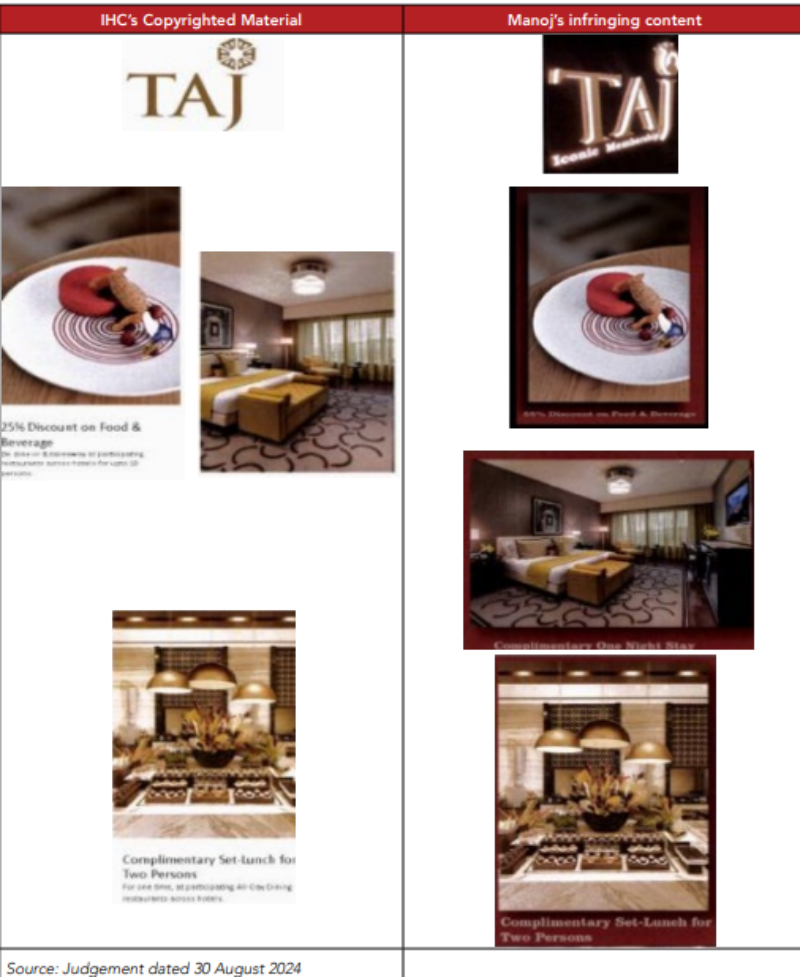- within Intellectual Property topic(s)
- in North America
- with readers working within the Consumer Industries and Law Firm industries
- within Litigation, Mediation & Arbitration, Family and Matrimonial and Environment topic(s)
- with Inhouse Counsel
INTRODUCTION
We are excited to bring you the latest edition of our newsletter, featuring key updates from the ever-evolving field of Intellectual Property (IP). This quarter has seen significant developments in judicial decisions, patent grants, and policy changes, all of which are shaping the future of IP protection. Courts across the country have continued to uphold the rights of brand owners, as evidenced by prominent cases such as the dispute around Indian Hotels Company Limited's trade mark 'Taj' and the trade mark 'Boroline' being declared as a wellknown. Another notable highlight is Louis Vuitton being awarded costs amounting to INR 5,00,000 for copyright infringement, accenting the intellectual property rights in advertisement material available on the internet.
One particularly impactful decision from the Delhi High Court involved a longstanding trade mark dispute between Lacoste and Crocodile International over the use of the crocodile logo. Further, in response to the growing impact of Artificial Intelligence across various sectors, the Bombay High Court took steps to protect the personality rights of renowned singer Arijit Singh against unauthorized use by AI platforms. Other key updates include the patent granted for Aadhaar Data Management Technology and the Goa High Court's decision to quash a state government circular that exempted hotels from obtaining copyright licenses.
We invite you to dive into this edition and explore these important updates. Thank you for your continued readership, and we hope you find this newsletter, both, insightful and enjoyable.
SNIPPETS
A PENDING APPLICATION FOR COMPULSORY LICENSE DOES NOT PROVIDE RIGHT TO CONTINUE INFRINGEMENT OF THE OWNER'S COPYRIGHT
In the case of Phonographic Performance Ltd. v. AlHamd Tradenation1 , the Delhi High Court ("Delhi HC") clarified that where a party has sought for a compulsory license and such application was pending, the alleged infringement (identified before filing of the application of compulsory license) cannot continue. Phonographic Performance Ltd. ("PPL") instituted a suit against ALHTN for using copyrighted content without payment of a license fee. Al-Hamd Tradenation ("ALHTN") argued that an application for compulsory license was filed due to the excessive licensing fees being charged by PPL, to which PPL claimed that there is no power under the law to challenge licensing fee.2 Pursuant to arguments from both sides, the Delhi HC granted an interim injunction in favor of PPL and against ALHTN. ALHTN was restrained from using the copyrighted content since the compulsory license was not yet obtained and the requisite license fee due to PPL was not paid.
NON-COMPLIANCE WITH THE TRADE MARKS ACT WAS DEEMED AN IRREGULARITY NOT A GROUND FOR DISMISSAL
In a recent case before the Hon'ble Karnataka High Court ("Karnataka HC"), Manjunatha MS ("MS") filed a petition concerning a trade mark dispute.3 The main issue revolved around the alleged non-compliance with certain procedural requirements stipulated under the Trade Marks Act, 1999 ("Trade Marks Act"). MS contended that the complaint against him was deliberately filed under the wrong legal provisions, namely Section 63 of the Copyright Act, 1957, rather than the appropriate sections of the Trade Marks Act. He asserted that this misfiling enabled the police to circumvent the requirement of obtaining the opinion of the Registrar of Trade Marks before carrying out search and seizure operations. MS claimed that this constituted an abuse of the legal system by both the complainant, K R Nagendra, and the investigating officers. MS sought the dismissal of the proceedings, citing procedural irregularities and alleged malicious intent. The present petition was filed alleging that the said procedural requirement was not complied with and must be a valid ground for quashing the proceedings. The Karnataka HC held that non-compliance with Section 115(4) of the Trade Marks Act constituted an irregularity rather than a ground for quashing infringement proceedings and dismissed the petition. In other words, the Karnataka HC classified these non-compliances as irregularities.
GROUND-BREAKING AADHAR DATA MANAGEMENT TECHNOLOGY RECEIVES PATENT PROTECTION
In a noteworthy development, the Indian government has granted a patent to Bengaluru-based company, SISA, for a pioneering system, Aadhar Data Discovery Engine, designed to manage Aadhaar data. The patented system introduces a novel approach to handling Aadhaar data, incorporating advanced encryption and secure data storage methodologies. The technology met the key requirements of a patent, which are, inventive step, novelty, and industrial applicability. According to Dharshan Shanthamurthy, CEO, the technology aims to help organizations in tourism, finance, banking, and alike to comply with the Unique Identification Authority of India protocols, while ensuring user data privacy, enhanced security protocols, and data confidentiality. The technology also masks any sensitive information of Aadhar holders. The ground-breaking technology furthers the Government's strategy to enhance the security of personal information of Aadhar card holders in India.4
ASIA NEWS INTERNATIONAL FILES COPYRIGHT INFRINGEMENT SUIT AGAINST PRESS TRUST OF INDIA FOR ALLEGED PLAGIARISM
Asia News International ("ANI") filed a copyright infringement suit against Press Trust of India ("PTI") before the Delhi HC.5 ANI alleged that PTI had copied its videos relating to the air-conditioning malfunctioning controversy from the Delhi-Darbhanga SpiceJet flight scheduled for June 19, 2024, amounting to copyright infringement, plagiarism, passing off, unjust enrichments, among others. ANI claimed that the alleged videos were posting by them on their X account and were subsequently, unauthorisedly used by PTI. A claim of INR 2 (two) Crore in damages has been allegedly claimed by ANI. Counsel appearing on behalf of PTI submitted before the Delhi HC, on the very first hearing in the matter, that PTI was willing to take down the impugned videos, without prejudice to PTI's rights and contentions. While the Delhi HC was inclined to refer the matter for mediation, ANI refused the same and instead, suggested the parties may talk amongst themselves.
DELHI HIGH COURT ORDERS FOR A FRAMEWORK TO REGULATE THE CONDUCT OF PATENT AND TRADE MARK AGENTS6
The Delhi HC has directed the Controller General of Patents, Designs, and Trade Marks to formulate a Code of Conduct for Patent and Trade Mark agents, in the backdrop of a petition filed against abandonment of a patent application. The Impugned Application was declared as abandoned for non-filing of response to First Examination Report issued by the Patent Office. The Delhi HC observed that there was enough evidence to prove that the petitioner was vigilant to follow up on the status of the application from the patent agent who had filed the application ("Patent Agent") however, the Patent Agent showed no diligence in communicating issuance of such First Examination Report to the Petitioner despite repeated follow-ups. The Delhi HC observed that the instant petition fell within the ambit of 'extraordinary circumstances' and therefore, set aside the abandonment order in question. Additionally, Delhi HC observed the negligence and misconduct of the Patent Agent and directed an inquiry against him. The Delhi HC also directed the said Code of Conduct to be notified by December 31, 2024.
BOMBAY HIGH COURT PROTECTS PERSONALITY RIGHTS OF FAMOUS SINGER ARIJIT SINGH AGAINST AI PLATFORMS
The Bombay High Court ("Bombay HC") issued an ex-parte injunction order in favor of the famous Indian singer, Arijit Singh ("Singh"), restraining certain Artificial Intelligence ("AI") platforms from using his image, voice, photo, manner of singing and any other attributable feature.7 Singh impleaded eight AI platforms and/ or their owners / founders / managers / promoters / promoters as defendants in the suit proceeding. Singh alleged that the defendants have used AI tools to create content mimicking Singh's attributes, enable users to convert text and speech Singh's AI voice version mimic Singh's voice, vocal techniques and the like. Pursuant to arguments made by Singh, it was held that freedom of speech and expression does not include exploitation of a celebrity's rights for commercial gain. The Bombay HCnoted that such unauthorized use not only disables the person from having control over his own personality and its exploitation, but also facilitates manipulation in the market. Acknowledging celebrities being more susceptible to personality rights infringement, the Bombay HC granted an ad-interim injunction order against the defendants and directed the infringing content to be taken down.
BOROLINE DECLARED AS A WELL-KNOWN TRADE MARK IN INDIA
While granting a permanent injunction order in favour of GD Pharmaceuticals Pvt. Ltd. ("GD Pharma") in a trade mark dispute, the Delhi HC declared GD Pharma's trade mark 'Boroline' as a well-known trade mark under the Trade Marks Act.8 The suit was filed by GD Pharma in 2018 against Cento Products (India) ("Cento") who were using the mark 'Borobeauty' with a deceptively similar trade dress. The suit was decreed upon Cento proposing to adopt a new trade dress, giving up the iconic green colour trade dress altogether, and change the name of their product to a different name which did not have the prefix 'BORO'. Further, while considering GD Pharma's prayer for declaration of the trade mark 'Boroline' as a well-known trade mark, the Delhi HC observed that the mark, which has been in use since around 1929, met the qualifications laid down under the Trade Marks Act for such declaration and hence, shall be added to the list of well-known trade marks, upon GD Pharma completing the requisite formalities.
DELHI HIGH COURT PROTECTS IHCL'S "TAJ" TRADE MARK
On August 30, 2024, the Delhi HC ruled in favour of Indian
Hotels Company Ltd. ("IHC") in a trade mark infringement
case filed by it against an individual, Manoj
("Manoj").9 It was the case of IHC that Manoj
has been making unauthorised use of its registered trade marks,
![]() .
.
Further, IHC also contended unauthorised use of its copyrighted content and photographs available on its official website under the trade name, 'Taj Iconic Membership' on its brochures, signages, website etc.

In response to the aforementioned contentions, there was no written statement filed by Manoj nor was any appearance entered on its behalf to defend his actions. Resultantly, the Delhi HC noted that Manoj was not only guilty of infringement of IHC's marks and photographs but also guilty of indulging in criminal activities of impersonation, which resulted in defrauding a jeweller. The Delhi HCfound that Manoj's use of IHC's Marks is likely to mislead the consumers and draw association of Manoj's business with that of IHC. Resultantly, it awarded INR 10 (ten) lakh in damages and INR 5 (five) lakh in costs to IHC and issued a permanent injunction to prevent further unauthorised usage of IHC's Marks.
INDIAN GOVERNMENT CONSIDERS STRICTER PENALTIES FOR MISUSE OF NATIONAL EMBLEMS
The Union Government is contemplating certain amendments to the Names and Emblem (Prevention of Improper Use) Act, 1950 ("Names and Emblem Act"), to increase fines and introduce imprisonment for violators.10 The Names and Emblem Act prohibits use of Names and Emblems (as defined under the Act) for trade, business or profession or in the title of any patent or in any trade mark, design or any name or emblem specified in the schedule of the Names and Emblem Act.
Under the existing legal framework, the penal liability for any violation for improper use of certain emblems and names is merely INR 500 (five hundred) per penalty.11 As per the publicly available sources, the Consumer Affairs Ministry has proposed raising the fine to INR 1 (one) Lakh for first – time offenders. Subsequently, for repeated misuse, the violators could face penalties of up to INR 5 (five) Lakh and a six – month jail term.
DPIIT WITHDRAWS MEMORANDUM THAT EXTENDED SCOPE OF STATUTORY LICENSING TO INTERNET TRANSMISSIONS
On August 21, 2024, the Department for Promotion of Industry and Internal Trade ("DPIIT") officially revoked its office memorandum dated September 05, 2016 ("Memorandum").12 As per the Memorandum, the applicability of Section 31D of the Copyright Act, 1957 ("Copyright Act") was expanded to include 'internet transmission' for statutory licensing of broadcasting literary and musical works and sound recordings. The above move comes pursuant to the decision passed by the Hon'ble Bombay HC in the case of Tips Industries Ltd. v. Wynk Music Ltd.13 where Tips and Wynk agreed on a license allowing Wynk Music to exploit Tips repertoire until October 2016 and in the absence of a written agreement later, Tips insisted Wynk to discontinue using the same and pay for usage during extension period. After prolonged negotiations on the minimum guaranteed amount, the parties could not come to a consensus resulting in Tips demanding royalty of INR 2.83 (two point eighty-three) crores against the exploitation of copyright. Aggrieved with the same, Wynk invoked Section 31D of the Copyright Act to assert its rights as a 'broadcaster'.
In 2023, a division bench of the Bombay HC ruled that Section 31D of the Copyright Act is restricted to traditional non-internet-based radio and television broadcasting and performances only and cannot be applied to any internet-based offering and on-demand streaming services. The case concluded with a final settlement order on 18 June 2024, requiring Wynk to pay Tips Industries a full and final settlement of INR 12 (twelve) crore.
INDIAN FILM-MAKER SOHAM SHAH FILED A SUIT AGAINST NETFLIX AND THE SQUID GAME DIRECTOR
On 13 September 2024, an Indian Filmmaker, Mr. Soham Shah ("Shah") filed a suit against Netflix ("Defendant 1") and Squid Game Director, Hwang Dong-hyuk ("Defendant 2") (together, "Defendants") before the United States District Court for the Southern District of New York.14
As per the complaint filed, Shah claimed that the show, Squid Games, is loosely based and resembles one of his 2009 released Indian movie, "Luck". The show in question involves a group of people who partake in lifethreatening activities for financial awards, which increase as people die during the games. Shah claims that this plot is identical to the 2009 movie in terms of its screenplay, characters, plot, themes, expression of characters. Shah further mentioned that upon the release of the show, the viewers of his film rushed to the Internet to note the many similarities between the two works.
While the case is still sub judice, Defendants have categorically rejected all such claims of plagiarism by Shah and has asserted that the Squid Games is Defendant 2's own creation. The main point of contention for Shah is that Defendant 2 conceptualized the idea at around the same time that Shah began working on the script of the movie "Luck" in the year 2006. Shah has sought for permanent injunction on the release of the upcoming season of the show and damages.
HC QUASHES GOA GOVT'S CIRCULAR EXEMPTING HOTELS FROM TAKING COPYRIGHT LICENSE
In the case of Phonographic Performance Ltd. v. State of Goa and Ors., the Goa bench of the Bombay HC addressed a petition filed under Article 226 of the Constitution15. Phonographic Performance Ltd. ("PPL") sought the quashing of a circular dated January 30, 2024 ("Circular"), issued by the State of Goa, which stated that performances of musical works at religious ceremonies, including weddings, do not violate the Copyright Act.
The Bombay HC held that the Circular extended the scope of Section 52(1)(za) of the Copyright Act, which allows certain acts during bona fide religious ceremonies to not be considered copyright infringement. The Court determined that the Circular, by interpreting this provision, overstepped the authority of State of Goa, as interpretation of the law is the domain of the courts. The Bombay HC concluded that the Circular interfered with the enforcement mechanism for copyright societies, thus rendering it illegal. As a result, the Circular was quashed and set aside for being beyond its lawful scope.
CCI – NO EVIDENCE OF P&G USING THE INFORMANT'S PATENTED GREEN TECHNOLOGY IN WHISPER ULTRA CLEAN
In Rajiv Rai Sachdev v. Procter & Gamble Hygiene and Health Care Limited and The Procter & Gamble Company, USA, the Competition Commission of India ("CCI") examined allegations of abuse of dominant position under Section 4(2)(c) of the Competition Act, 2002 ("the Competition Act") against Procter & Gamble Hygiene and Health Care Limited and The Procter & Gamble Company, USA ("P&G").16 Rajiv Rai Sachdev ("Informant"), who holds patents on a green technology for dyeing textiles, claimed that P&G's misused his technology without consent. He had submitted his innovation to P&G's "PG Connect + Develop" program, but P&G declined collaboration.
In 2021, P&G launched "Whisper Ultra Clean" sanitary pads with herbal oil, which the Informant alleged used his patented ideas. The Informant claimed this amounted to abuse of dominance, resulting in a denial of market access.
The CCI, while analysing the matter, defined the relevant market as the "market for disposable sanitary pads in India." However, it found that P&G did not hold a dominant position in this market, as other competitors, such as Johnson & Johnson, held significant shares. Furthermore, no evidence supported claims that P&G had used the Informant's technology or restricted his market access.
Consequently, the CCI dismissed the allegations and closed the case under Section 26(2) of the Competition Act.
To read the full article click here
The content of this article is intended to provide a general guide to the subject matter. Specialist advice should be sought about your specific circumstances.





